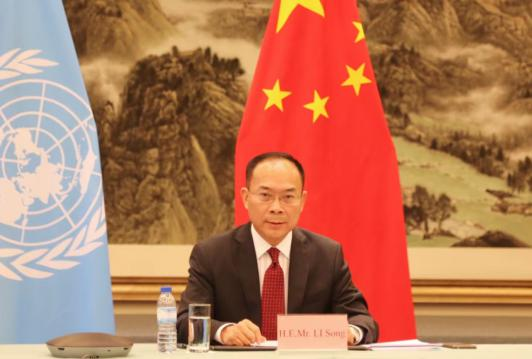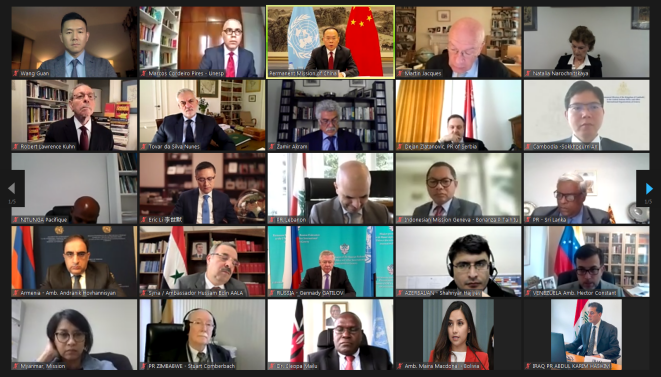(18 November 2021)
Honorable Excellencies,
Distinguished guests,
Ladies and gentlemen,

Welcome to the webinar. I am extremely delighted to meet online with my celebrity friends from various continents today. I would also like to thank PRs and colleagues in Geneva for their support for and participation in this event.
When I was discussing with Amb. GATILOV, Permanent Representative of the Russian Federation, on the idea of organizing this webinar, both of us agreed that such discussions are long overdue, and now is the right time to do it. Common goals with diversified approaches showcase exactly what we as diplomats are doing in various domains in Geneva. Last weekend an Irish pub on the street caught my eyes. On its billboard was “Uniting the Nations in Geneva Since 1996”. This tells exactly how Geneva should work as a platform where various countries can communicate with and learn from each other, seek common ground while shelving differences, coordinate and cooperate, and move forward in solidarity.
The color green makes the world full of life and vigor, but no two leaves in the world are identical. Civilizations are rich and diverse, and so is democracy. Democracy is the shared value of the humanity and human rights represent the common dream and pursuit of people across the world. Political civilizations and political institutions in various countries are deeply rooted in their own soil. They draw nourishment from their respective history, culture and tradition, and is cultivated through exploration, practice, and improvement in the process of the country’s economic and social development. Thus, diversified political systems and political civilizations are shaped in the world. Democracy is not something that could be mass produced. It is not delivered through exactly the same institutions and forms even among the Western countries, let alone between the West and the great number of developing countries. No matter what form it takes, true democracy means people being the master of the country. The people-centered approach is the only way to realize true and full human rights. Democracy and human rights are not decorations, nor luxuries, even less a monopoly of a handful of countries. Rather, it represents a right that people of all countries are entitled to. It means that the people of a country see their life improve day by day, and enjoy a growing sense of security, participation and gains. It reflects in broad smile on the faces of grown-ups and children alike.
Since the Modern times, the Chinese people have undergone prolonged exploration, struggle and efforts in their pursuit of national liberation and independence, of freedom and equality, of enjoyment of dignity and happiness, and of peace and development. This year marks the centennial of the founding of the Communist Party of China. In the past 100 years, the CPC, while uniting and leading the Chinese people, found a path that truly conforms with China's national conditions. Committed to realizing the lofty goal of national rejuvenation, the CPC has been promoting democracy and human rights.
We practice whole-process people's democracy in China. This effectively ensures that all the Chinese people run state affairs and social affairs, manage economic and cultural undertakings in various channels and ways according to law. In this way, we ensure that people are the true masters of the country.
We apply the principle of universality of human rights in the context of the national conditions. We see the right to subsistence and the right to development as the primary basic human rights, take holistic steps to advance the economic, political, social, cultural and environmental rights of the people, and strive to uphold social equity and justice and promote the all-round human development.
We adhere to a people-centered philosophy of development, improve people's livelihood through development, and ensure that development is for the people and by the people and that its benefits are shared among the people. We have built China into a moderately prosperous society in all respects, and have eradicated extreme poverty across the country.
The 19th Central Committee of the Communist Party of China adopted at its recently-held Sixth Plenary Session the Resolution on the Major Achievements and Historical Experience of the CPC over the Past Century. The resolution enables the world to understand not only where the CPC has come from, but in which direction and how it will unite and lead the Chinese people to move on to build the country, better the life of the Chinese people and contribute to peace and development of the world.
As Chinese, we are proud of the achievements China has made in promoting democracy and human rights, and we stand ready to share with other countries and peoples our practices and experience. That being said, we do not intend to impose China's model to others. Let me put it this way, Chinese food is delicious, but you cannot ask foreigners to have Chinese food only each and every day. Still less can you force them to do so. Likewise, we are eager to learn what lessons we can from the achievements of other cultures, and welcome helpful suggestions and constructive criticism. We will not, however, accept preaching from those who feel they have the right to lecture us. Whether the country is democratic or not should be left to his own people to decide. Dismissing forms of democracy that are different from one's own is in itself undemocratic. To interfere in other countries' internal affairs in the name of democracy and human rights, and to artificially give rise to confrontation will only entail turbulence, even disasters.
A couple of days ago when I was having a discussion with some ambassadors about the event today, they all agreed on the theme and expressed high expectations of the discussion that we are going to have today. This webinar, as I see it, aims to offer an open and inclusive platform where everyone can think out loud and to exchange diversified practices and experiences in democracy and human rights, and also to have discussions on such issues as to how to view and to address the differences in democracy and human rights in multilateral fora and international relations, and how to better promote and protect human rights through development. In this way, hopefully, we can have a more comprehensive understanding of and reflection on topics like democracy, human rights, and development.
Our panelists today are all world-renowned experts and scholars. Their outstanding remarks are much anticipated. We also look forward to hearing insights from Excellencies and colleagues who are joining us today.
Thank you very much.

